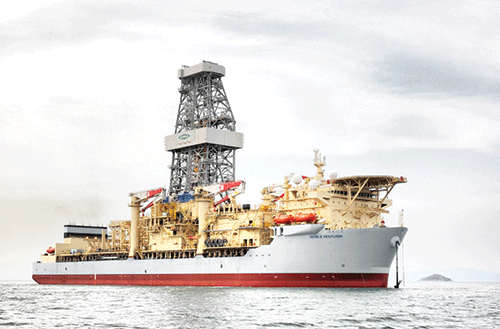Azule Energy, a BP and Eni joint venture, which is headquartered in neighbouring Angola, has officiallye entered Namibia’s ‘highly attractive Orange Basin.
Through Azule Energy, the joint venture between BP and Eni secured its first international deal, enabling it to enter into the highly prospective Orange Basin off the coast of Namibia, where a number of multinationals have confirmed massive oil discoveries.
Azule Energy last week signed an agreement with Rhino Resources Namibia for a 42.5% interest in an exploration block in the Orange Basin. Announcing the agreement, Azule confirmed this is its first investment in Namibia.
According to its website, Rhino Resources has been exploring in Namibia for over a decade, and it holds operatorship of Block 2914A (PEL 85) ,with an 85% participating interest.
“Located in the shallower portion of the very exciting Orange Basin, 2914A
is encircled to the outboard by the multiple Namibian discoveries made over the last two years, with the nearest discovery being less than 20km away.
In late 2022, Rhino designed and sole-funded the acquisition of a new 3D seismic survey, covering 1700 km2, with the aim of reconfirming and expanding the block’s lead inventory,” the company’s website
states.
Rhino Resources added that “early analysis of the new seismic cube, combined with extensive existing datasets, gives confidence in the multiple play types identified, and the abundance of drillable prospects”.
As such, Rhino states that together with its partners, the company is progressing with the planning and contracting of a two-well exploration drilling and testing campaign.
Rhino Resources is a privately- owned exploration company focused on delivering low-cost African energy solutions.
Meanwhile, Eni is an Italian-based entity involved in the exploration, development and production of hydrocarbons. It is also immersed in the supply and marketing of gas, liquefied natural gas (LNG) and power in the refining and marketing of petroleum products, as well as the production and marketing of basic petrochemicals and plastics, and is engaged in commodity trading.
BP, formerly known as British Petroleum, is a London-based company that provides energy products and services.
BP’s business units include gas and
low-carbon energy, as well as oil production and operations. Its gas business includes regions with upstream activities that predominantly produce natural gas and integrated gas and power.
BP’s low-carbon business includes solar, offshore and onshore wind, hydrogen and power trading. Its oil production and operations’ segment comprises regions with upstream activities that predominantly produce crude oil.
During the last two years, super-majors Shell and TotalEnergies have invested in Namibia’s Orange Basin following recent offshore finds ranking among the largest in decades.
Also, Chevron, ExxonMobil and Portugal’s Galp Energia have shared plans to double down on exploration in the Orange Basin.
Just last week, the National Petroleum Corporation of Namibia (Namcor) announced a Farm-Out Agreement with Chevron Namibia Exploration Limited (CNEL), a subsidiary of Chevron Global Energy Inc.
This agreement will see CNEL acquire an 80% operating working interest in Petroleum Exploration Licence 82 (PEL 82), situated in the prolific Walvis Basin, offshore Namibia.
Under the terms of the agreement, Namcor and Custos Energy will each retain a 10% carried interest.
Ebson Uanguta, interim managing director of Namcor stated: “The strategic partnership with Chevron and Custos Energy allows us to attract reputable international operators, such as Chevron, with financial capacity and technical expertise capable of safely drilling deepwater offshore wells to unlock hydrocarbon prospectivity in under-explored offshore areas such as the Walvis Basin”.
With the first phase of exploration complete, it is estimated that the field could contain nearly 10 billion barrels of oil.
Galp’s chief executive Filipe Silva said the discovery could underpin the company’s growth ambitions “for decades”.



